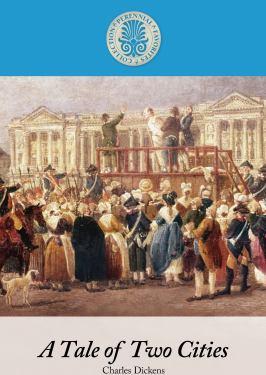
A tale of two cities
After eighteen years as a political prisoner in the Bastille the aging Dr Manette is finally released and reunited with his daughter in England. There two very different men, Charles Darnay, an exiled French aristocrat, and Sydney Carton, a disreputable but brilliant English lawyer, become enmeshed through their love for Lucie Manette. From the tranquil lanes of London, they are all drawn against their will to the vengeful, bloodstained streets of Paris at the height of the Reign of Terror and soon fall under the lethal shadow of La Guillotine.
Available Copies by Location
| Location | |
|---|---|
| Victoria | Available |
Other Formats
Browse Related Items
| Subject |
| Young men > England > Fiction. Ex-convicts > Fiction. Paris (France) > History > 1789-1799 > Fiction. London (England) > History > 18th century > Fiction. France > History > Reign of Terror, 1793-1794 > Fiction. |
| Genre |
| Large print books. Historical fiction. Fiction. |
- ISBN: 9781410436672
- Physical Description 607 pages (large print) ; 23 cm
- Edition Large print edition.
- Publisher [Place of publication not identified] : [publisher not identified], 2011.
Content descriptions
| General Note: | Originally published: 1859. GMD: large print. |
Additional Information

A Tale of Two Cities
Click an element below to view details:
Summary
A Tale of Two Cities
The "two cities" are Paris in the time of the French Revolution, and London. Dr. Manette, a French physician, having been called in to treat a young peasant and his sister, realizes that they have been cruelly abused by the Marquis de St. Evremonde and his brother. To ensure Dr. Manette's silence, the Marquis has him confined for eighteen years in the Bastille. The doctor has just been released, demented, when the story opens. He is brought to England where he gradually recovers his health and his sanity. Charles Darnay, concealing under that false name his identity as the nephew of the cruel Marquis, has left France and renounced his heritage. He falls in love with Lucie, Dr. Manette's daughter, and they are happily married. During the Terror, he goes to Paris to save a servant condemned by the mob. Darnay himself is arrested, condemned to death, and is saved at the last moment by Sydney Carton, a reckless wastrel who acts out of devotion to Lucie. Carton smuggles Darnay out of prison and takes his place on the scaffold, declaring "It's a far, far better thing I do than I have ever done before," surely one of the most quoted lines in all the history of literature.


